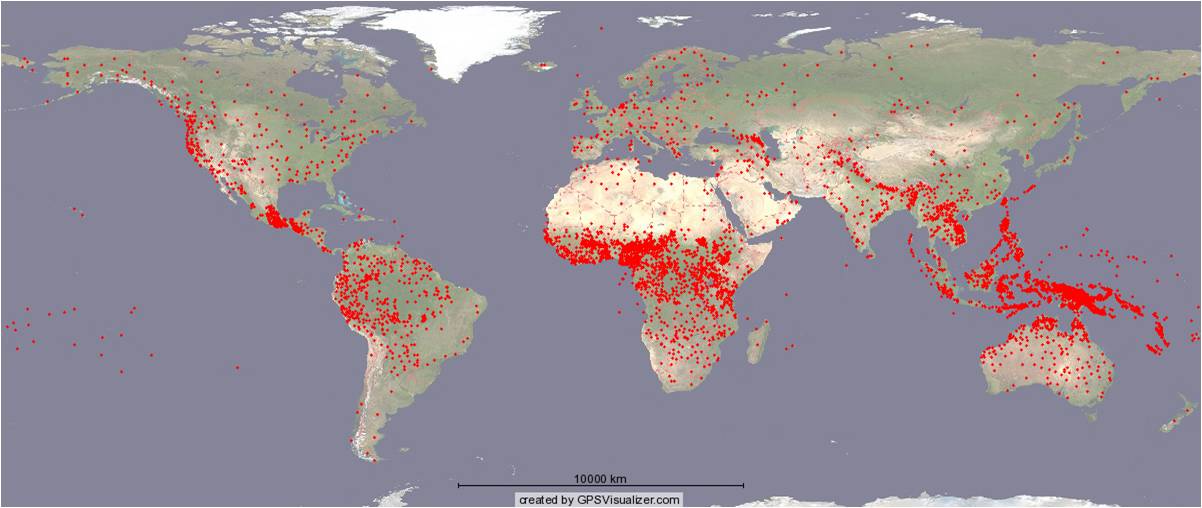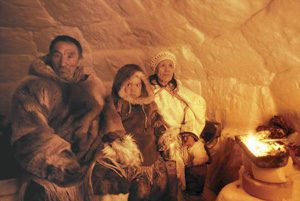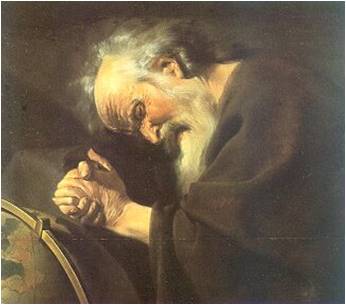Home | Research | Publications | Curriculum vitae |

Marcus John Hamilton
Research
Human macroecology
Human macroecology is the quantitative study of human-ecosystem interactions at multiple scales of social and biological organization, from the life histories of individuals and the demography of populations, to the structure of socioeconomies and the global distribution of human biocultural diversity. This multi-scale perspective seeks to understand the fundamental mechanisms that drive change in human biocultural diversity through time and space. A central goal of human macroecology is to develop a robust predictive (and retrodictive) science of complex human systems based on our knowledge of large-scale biological processes, and their underlyng physics. Of particular interest to me are the ways in which energy and information flows create structure in human populations, and how the first principles of physics, chemistry and biology have constrained the ecology, evolution, and diversity of human systems.Dynamics of cities, firms and markets
Cities, corporations, and markets are dominant features of contemporary human ecology. In the 21st century an increasing majority of humanity lives in cities, and virtually everyone on the planet participates in the global economy in one way or another. These features not only influence where we live, what we do, and with whom we interact, but they also impact our health, mobility, and fertility. In general, cities, firms and markets are centers of innovation that drive economic growth and so understanding their dynamics is essential to understanding the past, present, and future health of human societies, and our interaction with the planet. At SFI we are developing mathematical models of the dynamics of cities, firms, and markets. Our goal is to develop a quantitative, theoretical understanding of the mechanisms that drive the dynamics these key emergent features of contemporary complex human sysems that will lend insight both into the basic science of the evolution of complex human systems, but also address applied concerns of increasing urbanization, energy use, and sustainability.
Hunter-gatherer archaeology and paleoecology
Archaeology is the science that explores the spatial and temporal dimensions of human adaptation through the study of artifacts and their paleoecological context. I am particularly interested in hunter-gatherer archaeology and paleoecology, and the evolutionary mechanisms of cultural change. The archaeological record is the only long-term empirical record of cultural evolution over human evolutionary history, and so it is the task of archaeologists to use this record (as patchy as it may be) to describe, measure, and explain evolutionary processes in human societies at all scales. My archaeological research focuses primarily on the human paleoecology of the late Pleistocene North America, the colonization of the Americas, quantifying prehistoric population expansions, and modeling the dynamics of cultural evolution. My fieldwork focuses on the Paleoindian archaeology of the central Rio Grande Rift Valley during the late Pleistocene, including archaeological excavations at the Mockingbird Gap Clovis site, New Mexico with Bruce B. Huckell (UNM) and Vance T. Holliday (Arizona).
Scaling theory
Like all other biological species, humans are embedded within complex ecosystems, systems that are structuredby the flows of energy, matter and information between organisms and their environments. To meet resource requirements humans tap into these flows thus creating nonlinear feedbacks between human systems and their supporting ecosystems. Much of human evolutionary history over the past 50,000 years or so concerns the ways in which modern humans have developed novel ways of accessing, preocessing, and redistributing increasingly complex and powerful forms of energy and information from the Earth system. This is as true for hunter-gatherer foraging economies as it is for contemporary market-based economies. I use scaling theory to understand how network structures constrain the flows of energy and information in human systems, and how these flows interact. My research focuses on studying energy use in human societies using hypotheses derived from metabolic scaling theory. Recently in the Brown lab at UNM we have been using these principles to understand fundamental energetic constraints on the dynamics of economic systems, and what these might mean for the future of human societies
Behavioral and Evolutionary Ecology
Life history theory and demography are at the heart of human diversity. I am particularly interested in the energetic basis of life history and demography, and comparative energetics across human socioeties and biological species in general. The primary question of interest here is in what ways are humans a biologically predictable species, and in what ways are we seemingly unique? The answer to these questions highlights which ecologiclal pathways human evolution has followed, and can help explain how the human species came to be the most domnant species in Earth history. I have long-term collaborations with Rob Walker (Anthropology, Missouri), Oskar Burger (Max Planck) and John DeLong (Biology, Yale) where, in various combinations, we have looked at a wide variety of topics including global gradients in human body sizes, energetic constraints on human population growth rates, and various aspects of human reproduction.
"All is flux."
Heraclitus of Ephesus, 6th Century BC
Information contained in this document is © copyright Marcus J. Hamilton, 2010. All rights reserved.
Page designed and maintained by Marcus J. Hamilton



